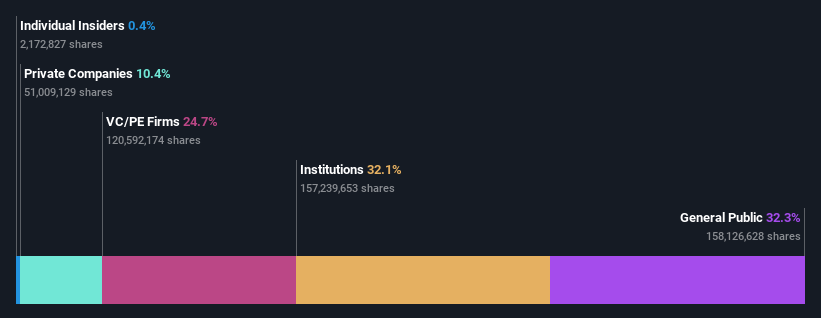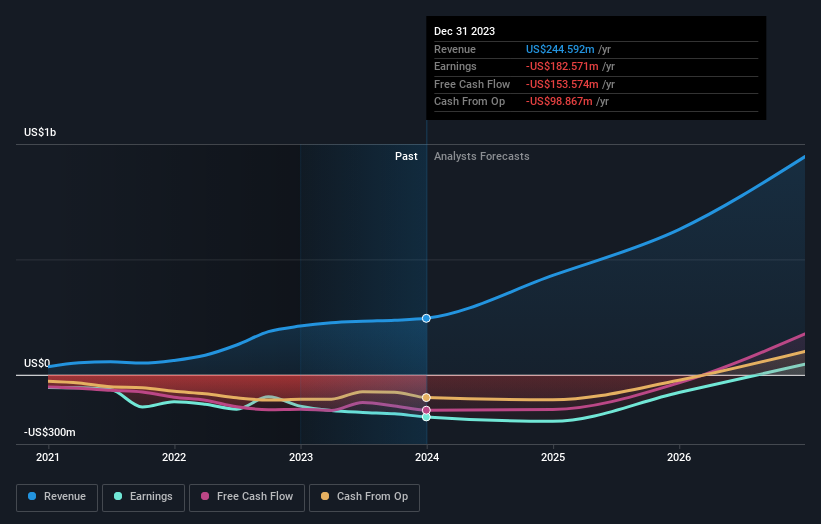Rocket Lab USA, Inc. (NASDAQ:RKLB) surges 3.1%; individual investors who own 32% shares profited along with institutions
Key Insights
The considerable ownership by individual investors in Rocket Lab USA indicates that they collectively have a greater say in management and business strategy
The top 7 shareholders own 51% of the company
If you want to know who really controls Rocket Lab USA, Inc. (NASDAQ:RKLB), then you'll have to look at the makeup of its share registry. The group holding the most number of shares in the company, around 32% to be precise, is individual investors. In other words, the group stands to gain the most (or lose the most) from their investment into the company.
Following a 3.1% increase in the stock price last week, individual investors profited the most, but institutions who own 32% stock also stood to gain from the increase.
Let's take a closer look to see what the different types of shareholders can tell us about Rocket Lab USA.
Check out our latest analysis for Rocket Lab USA
What Does The Institutional Ownership Tell Us About Rocket Lab USA?
Many institutions measure their performance against an index that approximates the local market. So they usually pay more attention to companies that are included in major indices.
As you can see, institutional investors have a fair amount of stake in Rocket Lab USA. This can indicate that the company has a certain degree of credibility in the investment community. However, it is best to be wary of relying on the supposed validation that comes with institutional investors. They too, get it wrong sometimes. It is not uncommon to see a big share price drop if two large institutional investors try to sell out of a stock at the same time. So it is worth checking the past earnings trajectory of Rocket Lab USA, (below). Of course, keep in mind that there are other factors to consider, too.
Hedge funds don't have many shares in Rocket Lab USA. Khosla Ventures, LLC is currently the largest shareholder, with 16% of shares outstanding. In comparison, the second and third largest shareholders hold about 10% and 8.3% of the stock.
On further inspection, we found that more than half the company's shares are owned by the top 7 shareholders, suggesting that the interests of the larger shareholders are balanced out to an extent by the smaller ones.
While studying institutional ownership for a company can add value to your research, it is also a good practice to research analyst recommendations to get a deeper understand of a stock's expected performance. Quite a few analysts cover the stock, so you could look into forecast growth quite easily.
Insider Ownership Of Rocket Lab USA
While the precise definition of an insider can be subjective, almost everyone considers board members to be insiders. Management ultimately answers to the board. However, it is not uncommon for managers to be executive board members, especially if they are a founder or the CEO.
I generally consider insider ownership to be a good thing. However, on some occasions it makes it more difficult for other shareholders to hold the board accountable for decisions.
Our data suggests that insiders own under 1% of Rocket Lab USA, Inc. in their own names. We do note, however, it is possible insiders have an indirect interest through a private company or other corporate structure. It's a big company, so even a small proportional interest can create alignment between the board and shareholders. In this case insiders own US$8.0m worth of shares. It is always good to see at least some insider ownership, but it might be worth checking if those insiders have been selling.
General Public Ownership
The general public-- including retail investors -- own 32% stake in the company, and hence can't easily be ignored. While this group can't necessarily call the shots, it can certainly have a real influence on how the company is run.
Private Equity Ownership
With an ownership of 25%, private equity firms are in a position to play a role in shaping corporate strategy with a focus on value creation. Some might like this, because private equity are sometimes activists who hold management accountable. But other times, private equity is selling out, having taking the company public.
Private Company Ownership
Our data indicates that Private Companies hold 10%, of the company's shares. It's hard to draw any conclusions from this fact alone, so its worth looking into who owns those private companies. Sometimes insiders or other related parties have an interest in shares in a public company through a separate private company.
Next Steps:
It's always worth thinking about the different groups who own shares in a company. But to understand Rocket Lab USA better, we need to consider many other factors. For instance, we've identified 2 warning signs for Rocket Lab USA that you should be aware of.
But ultimately it is the future, not the past, that will determine how well the owners of this business will do. Therefore we think it advisable to take a look at this free report showing whether analysts are predicting a brighter future.
NB: Figures in this article are calculated using data from the last twelve months, which refer to the 12-month period ending on the last date of the month the financial statement is dated. This may not be consistent with full year annual report figures.
Have feedback on this article? Concerned about the content? Get in touch with us directly. Alternatively, email editorial-team (at) simplywallst.com.
This article by Simply Wall St is general in nature. We provide commentary based on historical data and analyst forecasts only using an unbiased methodology and our articles are not intended to be financial advice. It does not constitute a recommendation to buy or sell any stock, and does not take account of your objectives, or your financial situation. We aim to bring you long-term focused analysis driven by fundamental data. Note that our analysis may not factor in the latest price-sensitive company announcements or qualitative material. Simply Wall St has no position in any stocks mentioned.

 Yahoo Finance
Yahoo Finance 

